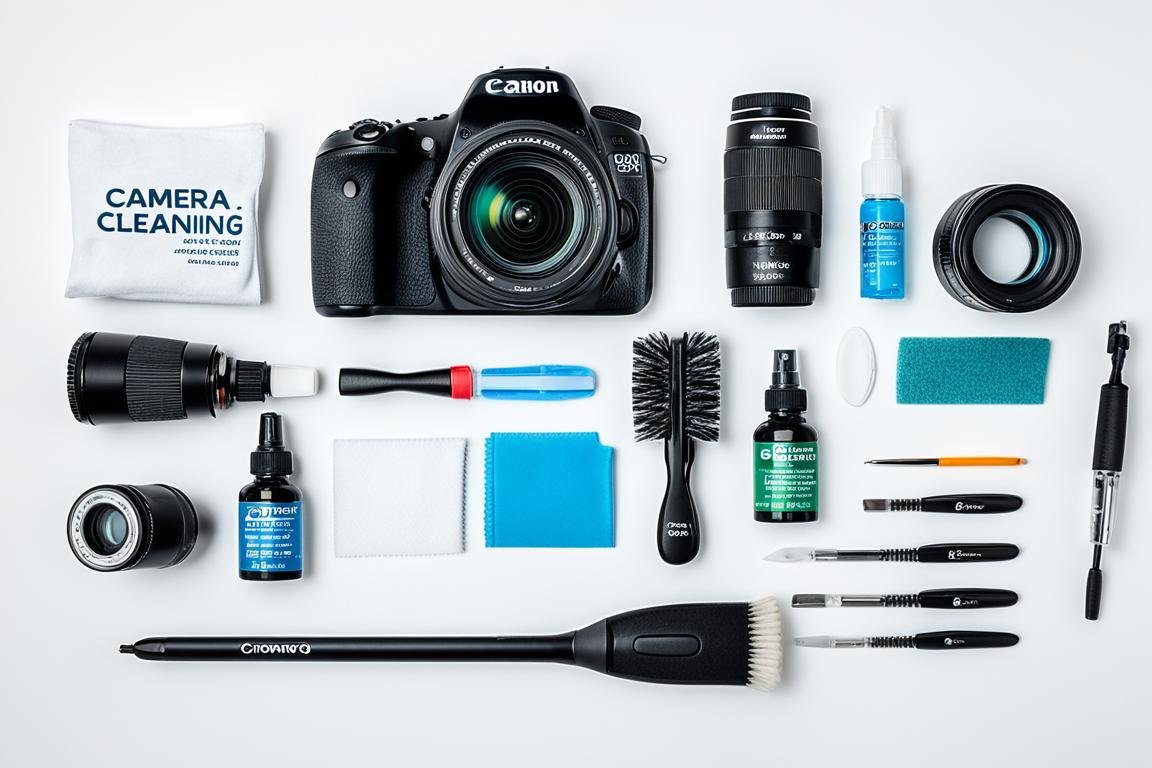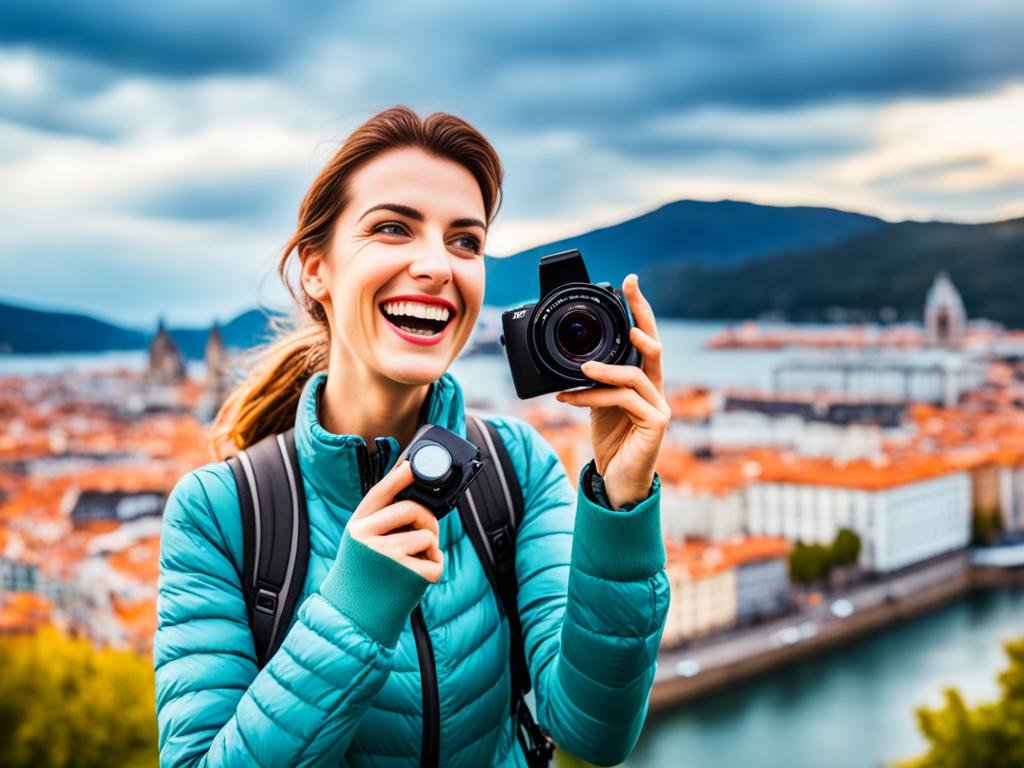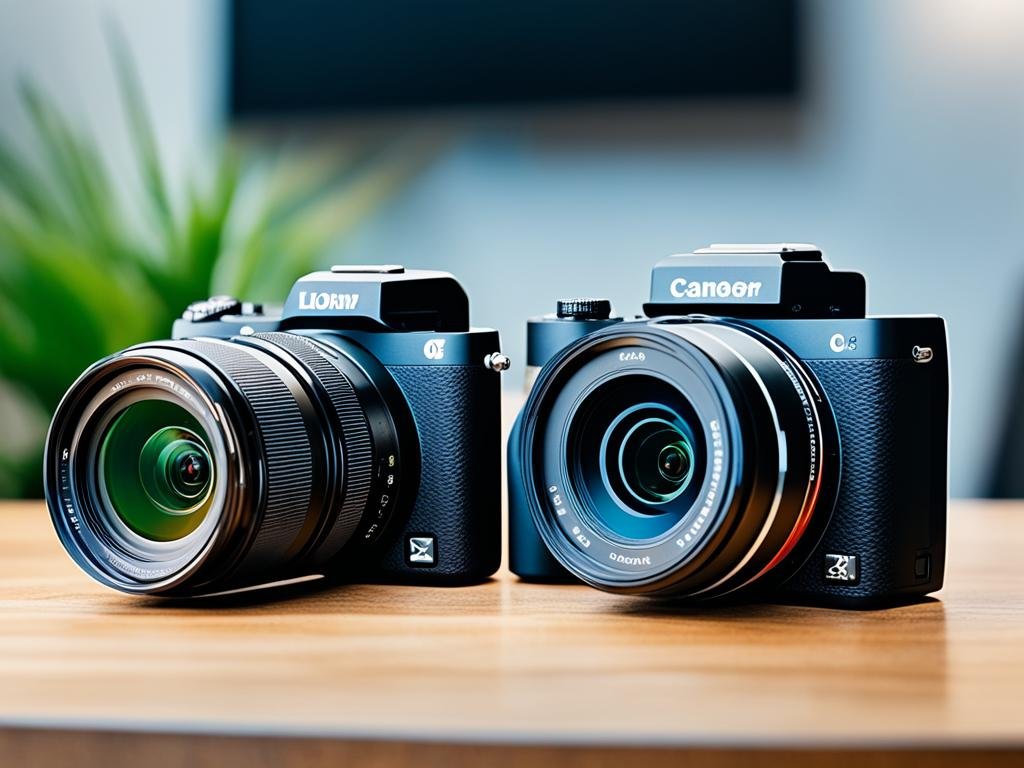Did you know dust, dirt, and smudges can ruin your photos? A study by the American Society of Photographers found that dirty gear can reduce image sharpness and color accuracy by up to 30%. That’s a big loss in quality no photographer wants.
But don’t worry! This guide will show you how to maintain and clean your camera equipment like a pro. It’s important for both professional photographers and hobbyists. Taking good care of your gear helps you get great photos and makes your equipment last longer.
First, gather some key items for your camera cleaning kit. You’ll need a camera lens cleaning pen, camera sensor cleaning swabs, a soft cloth, a camera air blower, a brush, cleaning solution, and lens wipes. These tools help remove dust, fingerprints, and debris that can ruin your photos.
Now, let’s learn the best ways to keep your camera equipment clean. With a bit of care, your gear will always be ready to capture amazing shots.
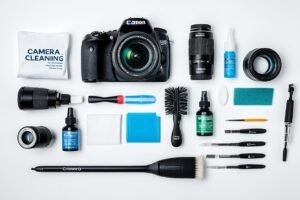
How to Clean Camera Lenses
Cleaning your camera lenses is key to keeping your photos sharp and clear. Dust and smudges can ruin your shots. Here’s how to keep your lenses spotless.
- Begin with a rocket blower to get rid of big dust bits. Hold the camera with the lens down and use short air bursts to clear the dust. Don’t use compressed air cans as they can harm the lens.
- Then, use a lenspen or a soft makeup brush to remove dust. Brush in circles to pick up dust without scratching the lens. Make sure your brush is clean to avoid adding dirt.
- If your lens has smudges, try a cleaning solution. Use pre-moistened lens wipes or a mild cleaner made for lenses. Put a bit of solution on a microfiber cloth and clean in circles. Be gentle to avoid damaging the lens.
- For tough stains or fingerprints, use a lenspen with cleaning solution. The lenspen’s special cleaner removes smudges without leaving marks.
- Don’t forget to clean the lens caps too. They can get dusty and dirty, which can get on the lens. Clean them with the same steps as the lenses.
Regularly cleaning your lenses keeps your photos sharp and extends their life. Always be gentle with the lenses and use the right cleaning tools and solutions.
Cleaning the Camera Body
Keeping your camera body clean is key to its performance and longevity. Regular cleaning boosts its look and keeps dust away from its parts. Here are some tips and tools for cleaning your camera body:
1. Start with an Anti-Bacterial Jelly Compound or Damp Cloth
Start by wiping the camera body with an anti-bacterial jelly or a damp cloth. Focus on buttons, dials, and grips as they get dirty easily. Use a soft cloth to avoid scratches.
2. Clean Hard-to-Reach Areas with Q-tips or Cleaning Solution
For tough spots, use Q-tips or a special camera cleaning solution. Dab a bit of solution on a Q-tip and clean around the viewfinder and other tight spots. Be careful not to soak the camera.
3. Remove Fingerprints and Smudges from the LCD Screen
The LCD screen gets fingerprints and smudges easily. Clean it with a lens pen or a gentle glass cleaner on a soft cloth. Wipe in circles until clean. Don’t press too hard to avoid damage.
| Camera Cleaning Tools | Description |
|---|---|
| Lens Pen | A versatile tool for cleaning lenses, viewfinders, and LCD screens. It features a retractable brush for dust and a non-liquid cleaner for smudges. |
| Q-tips | Great for tight spots like the viewfinder and buttons. Make sure they’re lint-free to avoid residue. |
| Glass Cleaner | A gentle glass cleaner removes fingerprints and smudges from the LCD. Pick one made for electronics. |
4. Avoid Excessive Cleaning
It’s good to keep your camera clean, but don’t overdo it. Clean only when it’s really dirty or as the maker suggests. This prevents damage and keeps your camera in top shape.
Regular cleaning with the right tools and methods keeps your camera working great. A clean camera body makes shooting better and protects your investment.
Sensor Cleaning
Cleaning your camera’s sensor is key to keeping your photos sharp. Dust on the sensor can ruin your shots. So, cleaning it often is a must for photographers. Let’s look at how to clean the sensor and what tools you need.
1. Bulb Blower: Begin with a bulb blower to get rid of loose dust on the sensor. This tool blows air gently to remove dust. Hold your camera with the lens down and blow air on the sensor. This helps get rid of big dust and gets your sensor ready for more cleaning.
2. Sensor Loupe: Next, use a sensor loupe for a closer look. It’s a tool that lets you see the sensor clearly. Attach it to your camera and turn on the sensor cleaning mode. Look through the loupe and mark any spots that need more cleaning.
3. Sensor Cleaning Fluid and Swabs: For tough dust or smudges, use cleaning fluid and swabs. Put a little fluid on a swab, making sure it’s damp but not dripping. With the mirror locked, gently wipe the sensor with the swab. Don’t press too hard to avoid damage.
Always check your camera’s manual for the right way to clean the sensor. Use cleaning fluids and swabs made for your camera type.
With the right tools like a bulb blower, sensor loupe, cleaning fluid, and swabs, you can keep your camera’s sensor clean. Remember to lock the mirror before cleaning to avoid damage.
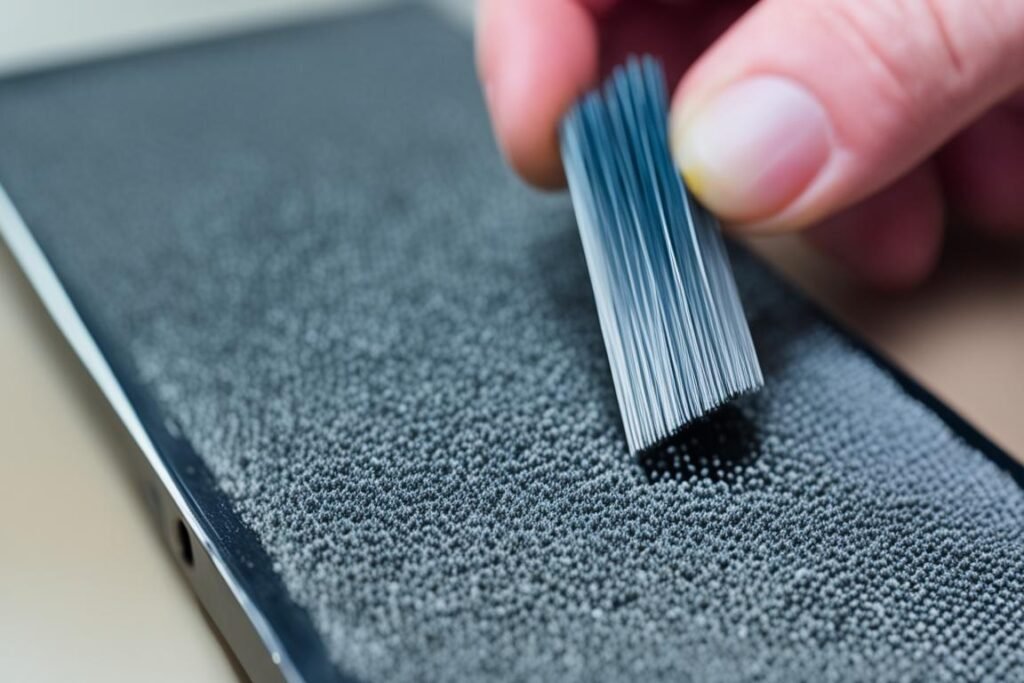
Keeping your camera’s sensor clean is important for photographers. By cleaning it regularly, you can take clear, dust-free photos and make your camera last longer.
Check Here for the Cleaning Products:
- Camera Cleaning Kit
- Camera Lens Cleaning Pen
- Camera Sensor Cleaning Swabs
- Camera Air Blower
- Brush
- Cleaning Solution
- Glass Cleaner
- Lens Wipes
- Q-Tips
Expert Maintenance and Repairs
Regular cleaning and maintenance can keep your camera equipment in great shape. But sometimes, you might need help from experts. Tasks like autofocus micro-adjustment or fixing complex problems need the skills of professionals in camera maintenance and repairs.
For camera maintenance, sensor cleaning is key. Dust and debris can make spots on your photos. A skilled technician at a trusted service center can clean your sensor safely. This ensures your images are clear and sharp.
Another service experts offer is autofocus micro-adjustment. This fine-tunes the autofocus system for accurate focusing. If your camera or lens keeps focusing wrong, an expert can fix it. This means your photos will be sharp and clear.
When your camera or lens gets physically damaged, expert maintenance and repair are crucial. Accidents can happen, and a service center approved by the manufacturer can help. They can check the damage, give you a repair quote, and fix your gear.
Water damage is another big worry for camera owners. If your camera gets wet, you should get help right away. Experts have the skills and tools to fix water-damaged cameras.
Choosing a qualified service center means your camera is in good hands. These experts know how to fix any problem, making sure your gear works perfectly.
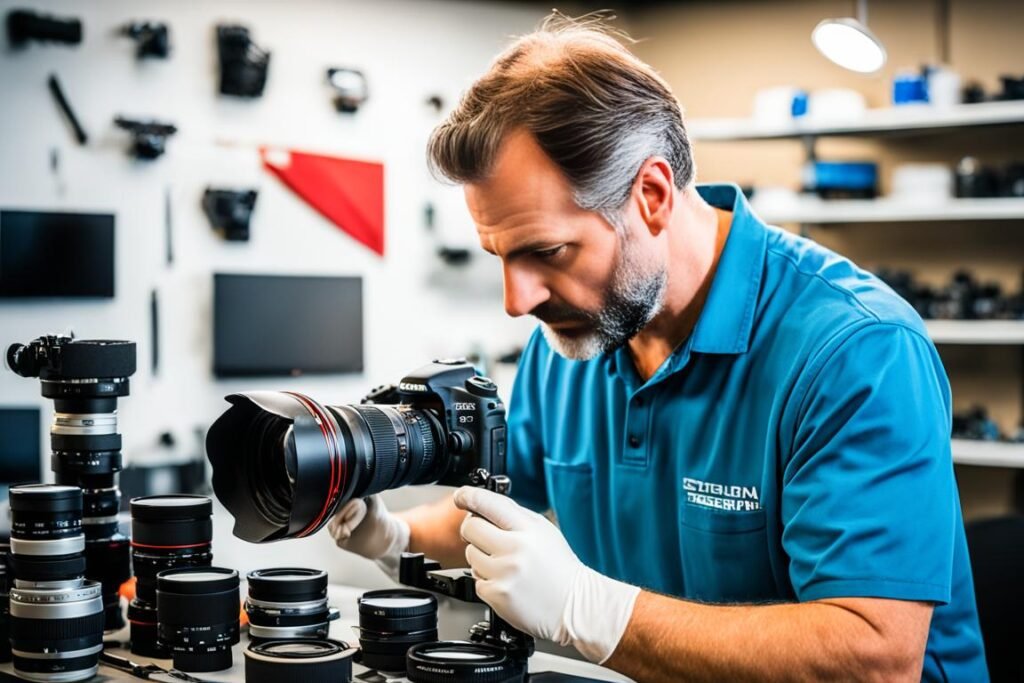
The Benefits of Expert Maintenance and Repairs
Here are the perks of using expert camera maintenance and repair services:
- Quality Assurance: Going to authorized service centers means you get genuine parts and professional repairs.
- Expertise: These technicians specialize in camera maintenance, repairs, and adjustments. They keep your equipment in top shape.
- Manufacturer Support: Authorized centers have direct access to manufacturer guidelines and updates. This ensures the best service for your gear.
- Extended Lifespan: Regular maintenance and timely repairs can make your camera gear last longer. This saves you money over time.
| Common Camera Repairs | Repair Cost Range |
|---|---|
| Lens Repair | $100 – $500 |
| Shutter Replacement | $150 – $400 |
| Sensor Cleaning | $50 – $150 |
| Autofocus Calibration | $75 – $200 |
| Water Damage Repair | $200 – $500 |
Remember, repair costs can change based on the issue’s severity, your camera model, and the service center’s prices.
Routine Camera Maintenance
Keeping your camera in top shape needs regular care. It’s key to make sure your gear works well and takes great photos. By doing simple steps and getting regular service, you can make your camera last longer and keep it working great.
Some places offer complete camera maintenance for a set price. These services cover things like cleaning the sensor, the focus screen, lubricating parts, and checking for wear. Cleaning the sensor gets rid of dust that can ruin your photos. Cleaning the focus screen helps with accurate focus and cuts down on distractions when you look through the viewfinder.
During these check-ups, experts will look for any signs of wear and tear. They’ll check things like buttons, dials, and connectors for any problems. Fixing these small issues early stops them from turning into big, expensive problems later.
It’s a good idea to get your camera checked every few years or as the maker suggests. These regular visits let you find and fix small problems early. They make sure your camera keeps working well. Plus, they keep your warranty valid and protect your investment.
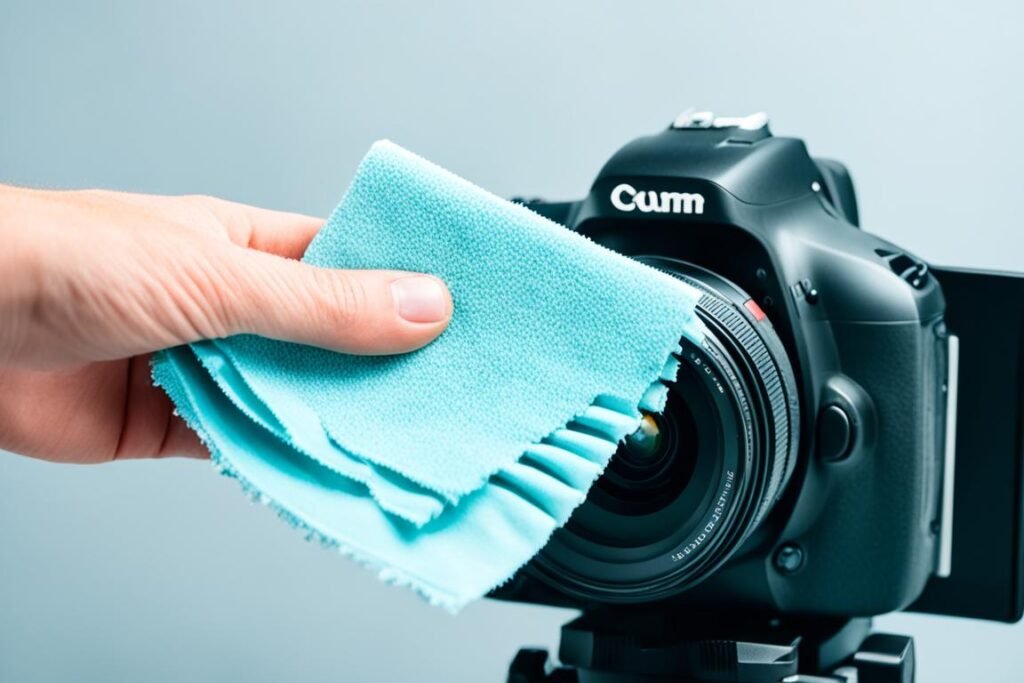
But, you don’t have to wait for a pro to take care of your camera. You can do things yourself to make it last longer. Clean your camera, lenses, and accessories with the right tools and methods. Keep them safe in a bag or case when you’re not using them to avoid damage.
Putting routine camera maintenance first means your gear will always give you great results, even when you’re shooting a lot. Whether you’re a pro or just love taking pictures, taking good care of your camera is a smart move that pays off.
Camera Insurance and Protection
Protecting your camera is key, and the right insurance is vital. Camera insurance helps by covering accidental damage and theft. Make sure you know your policy well to get the right coverage for your needs.
Choosing the right camera insurance means looking at accidental damage coverage. Accidents can lead to expensive repairs or needing a new camera. With good insurance, you won’t worry about unexpected damage.
Preventing damage is just as crucial as insurance. Many cameras are made to handle the weather, but you should still protect them. Keep your camera safe from too much rain, dust, and other harsh elements.
Port covers are great for keeping dust and water out. They cover your camera’s openings and ports, like the USB port and memory card slot. This keeps moisture and dirt away from your camera.
“Camera insurance provides a safety net for unexpected accidents, while weatherproofing and port covers add an extra layer of protection, ensuring your camera stays in optimal condition.”
Keep your camera clean and follow the maker’s care tips to make it last longer. Use a clean, microfiber cloth and the right cleaners to remove dirt and smudges.
Investing in camera insurance and protecting your camera can save you a lot of money. It lets you keep capturing moments without worry.
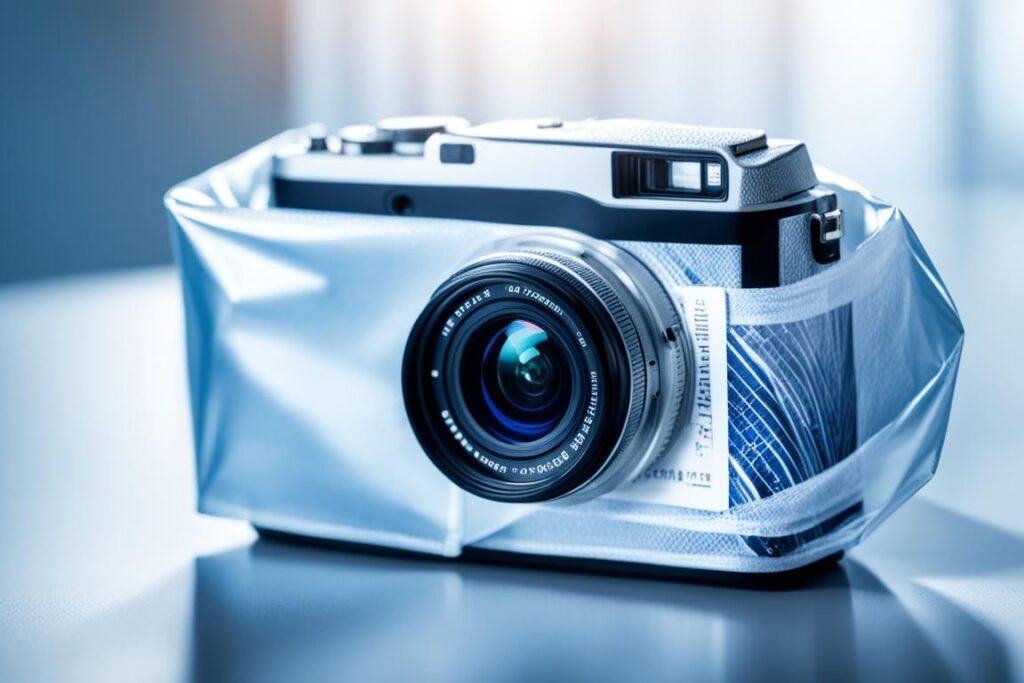
General Camera Cleaning Tips
There are some general tips for cleaning your camera that apply to all parts. These tips help keep your camera in top shape for great performance.
1. Use a bulb blower and brush
Begin by using a bulb blower to get rid of dust and debris. Squeeze the bulb to release air, aiming it at dusty spots. For tough spots, like camera corners and lens crevices, use a soft brush.
2. Wipe down the camera body
To clean the camera body, use a damp cloth for dirt, salt, or mud. Don’t use too much water to avoid damage. Make sure the cloth is clean and won’t scratch the camera.
3. Clean the LCD screen with alcohol or lens cleaner
The LCD screen needs regular cleaning. Use alcohol or lens cleaner made for cameras. Put a little on a cloth and wipe in circles. Be gentle to avoid scratches.
4. Regularly inspect and clean the camera strap
Don’t forget to clean your camera strap, which can get dirty. Check it often for wear or stains and clean it with mild soap. Let it dry before putting it back on your camera.
5. Store your camera in a clean and dry environment
Storing your camera right is key to keeping it clean. Don’t leave it in dusty or humid places. Use a padded camera bag or case to protect it from damage.
6. Schedule professional camera maintenance
Regular cleaning is good, but getting professional help is also key. Experts can check your camera, fix problems early, and keep it running well. This can make your camera last longer and work better.
Follow these tips to keep your camera clean and ready for amazing photos and videos.
Conclusion
Keeping your camera clean and well-maintained is key to its long life and best performance. Clean your camera lenses, sensor, and body often to stop dust and dirt from ruining your photos. Regular checks also help spot and fix small issues early.
Using top-notch cleaning tools and the right techniques keeps your gear looking new. Always use special lens cleaners, microfiber cloths, and air blowers to carefully remove dirt from lenses. For the camera body, use a soft cloth to gently wipe off fingerprints and smudges.
Sometimes, you might need professional help for tough dust or sensor spots. If so, getting expert advice is best to avoid more damage. Always check your gear often and think about getting camera insurance for protection against accidents, theft, or loss.
With the right care and regular cleaning, your camera can keep making great photos for many years. Make a cleaning routine and take care of your gear. This way, your camera will always be ready to capture those special moments.
FAQ
How do I clean my camera lenses?
How do I clean the camera body?
How do I clean the camera sensor?
When should I seek professional camera maintenance and repairs?
What is routine camera maintenance?
Does camera insurance cover accidental damage?
What are some general camera cleaning tips?
Why is proper maintenance and cleaning important for camera equipment?
Source Links
- Step by Step How to Clean and Care for Your Camera Gear – https://digital-photography-school.com/clean-care-camera-gear/
- How to Clean Your Photography Gear and Keep it in Good Shape – https://digital-photography-school.com/how-to-clean-your-photography-gear-and-keep-it-in-good-shape/
- Camera maintenance: how to clean your camera and equipment – https://amateurphotographer.com/technique/expert_advice/camera-maintenance-how-to-clean-camera/
Disclaimer:
This blog contains affiliate links. If you click on these links and make a purchase, I may earn a commission at no additional cost to you. This helps support my site and allows me to continue providing valuable content.
All photos used on this site are for illustrative purposes only. The actual product may vary due to product enhancements and differences in lighting and screen display.
Some content on this site may be generated by AI, including text and images. I strive to provide accurate and useful information, but please verify details independently.
Please note that product availability and prices are subject to change. I do my best to keep information up-to-date, but stocks may be out and prices may differ from those listed.
Thank you for supporting my blog!
